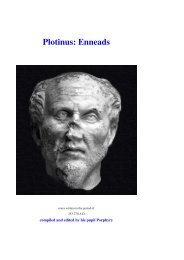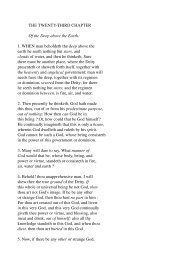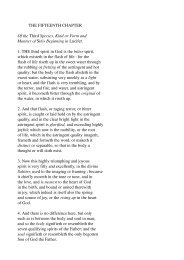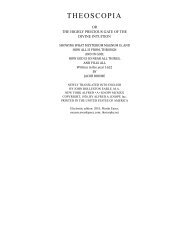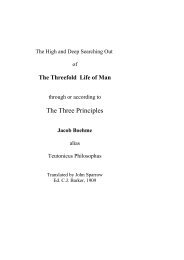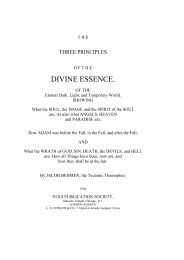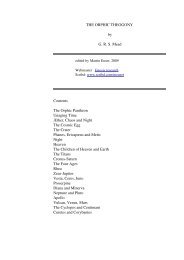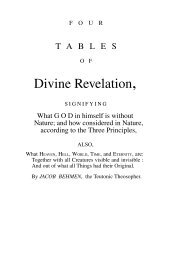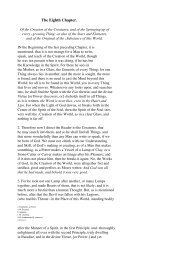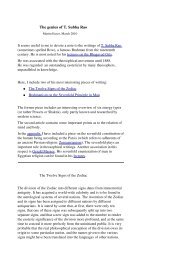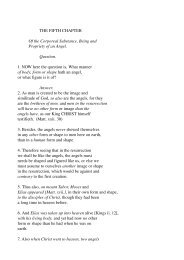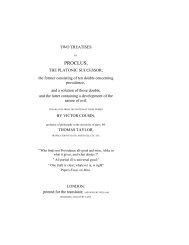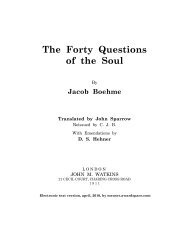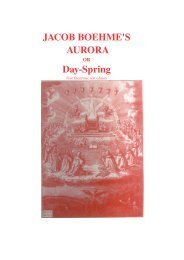Gerald Massey's Lectures - Society in evolution - Awardspace
Gerald Massey's Lectures - Society in evolution - Awardspace
Gerald Massey's Lectures - Society in evolution - Awardspace
You also want an ePaper? Increase the reach of your titles
YUMPU automatically turns print PDFs into web optimized ePapers that Google loves.
of them that slept!" But <strong>in</strong> what sense? It is impossible to apply such descriptions to any<br />
historical character. No Historical Jesus could be the First-born from the dead.<br />
If cont<strong>in</strong>uity be a natural fact, as was held by the Gnostics (and Paul was a Gnostic!), and<br />
is ma<strong>in</strong>ta<strong>in</strong>ed by all Spiritualists (and Paul was a Spiritualist!), we shall live on by a law<br />
of nature, not by some jugglery with natural law, called a miracle, performed once upon a<br />
time! The first-born from the dead could not have waited for the resurrection until Anno<br />
Dom<strong>in</strong>i; nor could our spiritual cont<strong>in</strong>uity have been demonstrated at that or any previous<br />
period by a physical resurrection, such as forms the foundation of the Christian faith! The<br />
doctr<strong>in</strong>e enunciated by Paul was Egyptian, Chaldean, Kabbalist, and Gnostic, and, as<br />
such, it can be expla<strong>in</strong>ed.<br />
In the Ritual the soul that rises aga<strong>in</strong> from the dead exults and exclaims, "I am the only<br />
one that comes forth from the body!" that is, as the supreme soul of all the seven; the one<br />
representative of the pleroma of powers, or as Paul has it, "the first-born of many<br />
brethren;" the first-born from the dead, because the only one that atta<strong>in</strong>ed immortality, as<br />
the spiritual man, or the Christ, called the Second Adam by Paul; that celestial man<br />
referred to by Philo when he says: "There is the man whose name is East. A strange<br />
appellation if it had been <strong>in</strong>tended to speak of a man composed of soul and body. But if it<br />
be the Incorporeal man, who comprehends <strong>in</strong> himself the div<strong>in</strong>e Idea, it must be admitted<br />
that East is the name that suits him best;" i.e., the re-orient man of the resurrection, or rearis<strong>in</strong>g.<br />
It is the same Gnostic typology employed by Paul when he speaks of "build<strong>in</strong>g<br />
up the body of Christ; till we all atta<strong>in</strong> unto the unity of faith, and of the knowledge (or<br />
Gnosis) of the Son of God; unto a full-grown man; unto the measure of the stature of the<br />
fulness of Christ." The fulness of the Christ be<strong>in</strong>g the Egyptian, Buddhist, and Gnostic<br />
pleroma of all the seven preced<strong>in</strong>g powers that culm<strong>in</strong>ated <strong>in</strong> the Christhood.<br />
One title of the Gnostic Christ is "All th<strong>in</strong>gs." He is called Totum, or "All th<strong>in</strong>gs."<br />
Noth<strong>in</strong>g short of the Gnosis can tell us why. The Christian world is without the Gnosis,<br />
and therefore without the means of understand<strong>in</strong>g Paul! Concern<strong>in</strong>g the formation or<br />
creation of the Gnostic Christ <strong>in</strong> the character of "All th<strong>in</strong>gs," or Totum, we are told that<br />
"The whole pleroma of the Æons, with one design and desire, brought together whatever<br />
each one had <strong>in</strong> himself of the greatest beauty and preciousness, and unit<strong>in</strong>g all these<br />
contributions, so as to skilfully blend the whole, they produced a be<strong>in</strong>g of most perfect<br />
beauty, the very Saviour Christ." This "All th<strong>in</strong>gs," who was the consummate flower of<br />
the fulness or pleroma of the previous seven powers, is the Christ of Paul, who, himself,<br />
is "All th<strong>in</strong>gs," because <strong>in</strong> "him are all th<strong>in</strong>gs," and <strong>in</strong> "all th<strong>in</strong>gs" he has the preem<strong>in</strong>ence.<br />
"All th<strong>in</strong>gs are summed up <strong>in</strong> Christ" (Eph. i. 10). "Of him, through him, and<br />
unto him, are all th<strong>in</strong>gs" (Rom. xi. 36). "In him dwelleth all the fulness of the Godhead<br />
bodily" (Col. ii. 9). That is as the Gnostic Totum!--the All--The Christ--the eternal Soul<br />
or Spirit, <strong>in</strong> "whom all the treasures of wisdom and knowledge" are hidden! He warns his<br />
followers aga<strong>in</strong>st a certa<strong>in</strong> false teacher, whom he knows personally, and might name,<br />
and whose teach<strong>in</strong>g is after the "tradition of men, after the rudiments of the world, and<br />
not after the Christ" of the pleroma. The Gnostic Christ was also called Eudocetos,<br />
because the whole pleroma of the Godhead was well pleased with him as glorifier of the<br />
Father. This is Paul's Christ, <strong>in</strong> whom the whole fulness (pleroma) was pleased to dwell.<br />
The text <strong>in</strong> Paul's Epistle to the Colossians should be "for the whole fulness was pleased<br />
to dwell <strong>in</strong> him." There is neither "God" nor "Father" <strong>in</strong> the case. It is the whole Gnostic<br />
pleroma of powers which made up the immortal soul, or came to the consummate flower<br />
of soul <strong>in</strong> man, and the Godhead <strong>in</strong> the Christ, as sum total of the powers. The Ancient<br />
Gnosis comes first. Paul repeats it; and then we have an adaptation of it to the later gospel<br />
history, <strong>in</strong> which we hear the voice of the Father <strong>in</strong> heaven say<strong>in</strong>g: "This is my beloved<br />
Son <strong>in</strong> whom I am well pleased." The Gnostics did not derive their knowledge from the<br />
history, any more than Paul did, and therefore it follows that the history was derived from<br />
an adaptation of the Gnosis.



